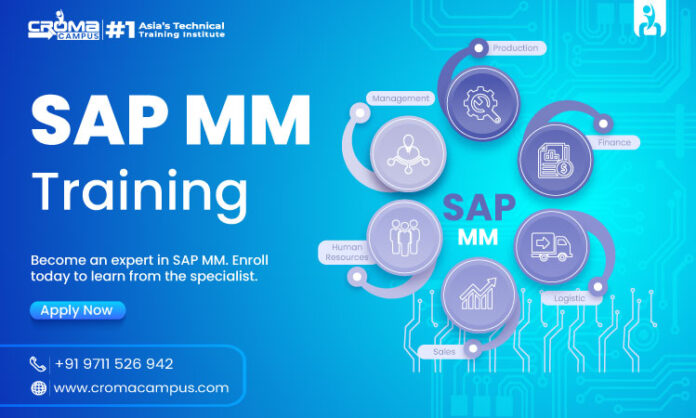SAP MM is widely in use across the organization, its different modules are capable enough of taking care of key business areas in an enterprise structure.
Introduction
Today, many businesses use SAP Material Management to handle purchase and transaction data. The planning procedure helps the industry from product delivery to procurement with SAP Material Management. The SAP MM Module is made up of numerous components. Together helps in managing vendors’ process and material procurement, value and quality assessments, and vendor payments. The SAP MM Module also includes the SAP Business Process as a core component. It actually helps housing management, unit maintenance, production, distribution, and sales. Lastly, also assists in overseeing the organization’s inventory and human resources. Getting through SAP MM Course can help you prepare in the correct direction. Also, when you are well aware of its descriptive process you can more efficiently perform the process.
Different Modules in SAP MM
Master Data in SAP MM
Master Data, basically looks after Material quantities, descriptions, unit prices, and cost calculations for inventory control purposes. This master data serves the purpose of both internal and external procurement processes. In order to improve operations controlling buying and inventory control activities; all this important material information, including quantity descriptions, unit measurements, cost calculations, costing information, and vendor details, remains secure in the material master record.
Scheduling Arrangement in SAP MM
In the SAP Materials Management (MM) module, a Scheduling Agreement (SA) is a general agreement between two parties. Wherein one party (typically the vendor) guarantees that products or services they owe (typically customers) within a particular time frame. Scheduling Agreements are frequently contractual in nature. And exist exclusively between vendors and customers (such as an agreement for purchasing specific types of products/services from certain vendors).
Batch Record in SAP MM
A “Batch Record” gives a thorough account of producing one batch of goods using particular materials and techniques. Combining together with information on quality control tests, any necessary corrective actions, and the date of batch available for purchase or shipment.
SAP systems keep a note of this information when working in industrial environments. For maintaining accurate tracking of materials and processes. Later using the data, you can even perform quality checks.
Pricing Procedure in SAP MM
SAP MM pricing processes determine the final cost of goods or services coming from vendors. An order’s kind, price calculation, the amount of taxes, and other relevant levies determine from the order itself.
Additionally, many price elements, such as discounts, rebates, taxes, surcharges, freight expenses, and material costs are all taken into account by this pricing technique. It may even be customized particularly to the needs of an organization.
Inventory Management in SAP MM
In SAP MM, inventory management is the process of accurately recording the supplies, raw materials, and final products that a company maintains on hand. In order to better manage stock levels, spot instances of insufficient stock, plan production requirements more precisely, and foresee production needs. It further requires monitoring products all over their supply chains, from production through delivery to customers. With this module, you have all the resources at your disposal. Mainly, for inventory management, including the ability to follow product flows. With their movement from manufacture to distribution and keep an eye on inventory levels.
What is the Exact Role of SAP MM?
Resource management, master data management, and material & resource planning; are all interwoven end-to-end processes from the SAP Material Management (MM) module.
Any company’s logistics and supply chain processes can simplify and automate using SAP MM. Starting from planning material requirements and purchasing through getting approval. To further evaluate material value analysis, manage warehouse inventory, and lastly handle distribution.
In integration with other modules, this module provides production planning, project administration, and delivery tracking capabilities. As part of a comprehensive logistics and supply chain management solution.
Key Features of SAP MM
- It addresses both material management and inventory management.
- It is actually a procedure of frequently looking over the supply chain gap or shortage in a business.
- Further, it also monitors buyers’ actions.
- Regulate the Company’s Assets (Products and Services), expedite production, and reduce operating expenses.
- It consists of all Key Data, Priority Measurement, Priority Requirements, Invoice Verification, etc.
Conclusion
The SAP MM module is still in high demand in the modern era of technology. Since it is necessary for all firms to manage their material in a dependable way. The SAP MM module aids in keeping businesses productive and current. Getting through SAP MM Online Training can help you prepare to get the necessary knowledge.








